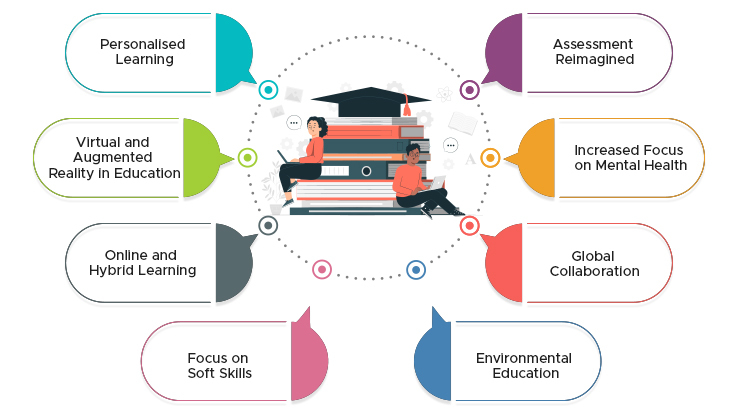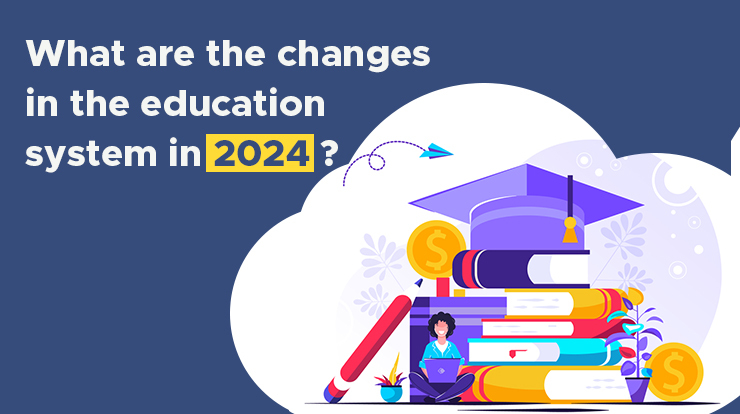Education is constantly evolving to meet the needs of students and society. In 2024, we can expect to see some exciting changes in the education system that will impact students, teachers, and parents alike. These changes are designed to make learning more accessible, engaging, and effective.
In this blog, we will explore the key changes in the education system for 2024 and what they mean for everyone involved .

Personalised Learning
The shift towards personalised learning in the educational system in 2024 will be one of the biggest shifts. This implies that students will have more say over how they choose to learn. Educational institutions are going to use technology to customise classes to individual student’s needs, strengths, and interests rather than taking a one-size-fits-all strategy.
How it works: To determine each student’s learning style and modify the curriculum accordingly, teachers will use data and AI techniques. Students are able to learn at their own pace and concentrate on the areas where they require additional assistance.
Virtual and Augmented Reality in Education
Virtual and augmented reality in education VR and AR will be used often in the classroom as educational tools. Students will be able to study and engage with subjects in new and engaging ways thanks to these technologies.
Example: Think about learning biology by virtually dissecting a frog or studying history by virtually visiting historical civilizations. Learning will be more interesting and memorable, thanks to VR and AR.
Online and Hybrid Learning
The COVID-19 pandemic boosted the growth of online education, which will remain a prominent component of education in 2024. In order to give students flexibility, many schools and colleges will offer hybrid learning alternatives that combine in-person and online sessions.
Benefits: Hybrid learning makes education more accessible by allowing students to take classes from any location. Additionally, it teaches useful digital skills that are crucial for the job market of the future.
Focus on Soft Skills
In addition to traditional subjects, schools will place a greater emphasis on teaching soft skills such as critical thinking, problem-solving, communication, and adaptability. These skills are vital for success in the modern world.
Why it matters: Soft skills are transferable and can be applied in various situations, making students more well-rounded and better prepared for the workforce.
Assessment Reimagined
In 2024, traditional standardised testing will lose ground. Alternative evaluation techniques that more accurately reflect a student’s actual skills and development will be investigated by educators. Project-based evaluations, portfolios, and practical problem-solving exercises may all be a part of this.
Advantages: Students won’t be limited to using tests as their only means of knowledge demonstration. Instead, they can demonstrate their talents and originality in more meaningful ways.
Increased Focus on Mental Health
Recognising the importance of mental health, schools will prioritise the well-being of students. There will be more resources and support for students dealing with stress, anxiety, and other mental health issues.
What it means for students: A healthier, happier learning environment where students can thrive both academically and emotionally.
Global Collaboration
Education in 2024 will be more globally connected than ever before. Students will have opportunities to collaborate with peers from around the world, breaking down geographical barriers.
Benefits: This fosters cultural understanding and prepares students for a globalised workforce.
Environmental Education
With growing concerns about climate change, schools will integrate environmental education into their curricula. Students will learn about sustainability, conservation, and the importance of protecting our planet.
Why it’s important: Equipping the younger generation with knowledge about environmental issues empowers them to make informed decisions and take action for a sustainable future.
Conclusion
In 2024, the educational system should be able to provide more individualised, interesting, and pertinent learning opportunities. These modifications will help students by meeting their specific requirements, preparing them for a world that is changing quickly, and enhancing their general well-being. Accepting these changes opens the way for a brighter and more promising future in education for parents, teachers, and students
So, if you are looking for the top colleges in Rajasthan for getting advanced knowledge and learning, Sangam University. We are known for providing updated and advanced education to our students to make them fit for their future endeavours. Contact our team to know more.
FAQs
1. FAQ: What is personalised learning, and how will it benefit students?
Answer: Personalised learning is an educational approach where lessons and materials are tailored to each student’s individual needs, interests, and pace of learning. It benefits students by allowing them to have a more customised learning experience, which can improve engagement and understanding.
2. FAQ: How will virtual and augmented reality be used in education, and what are the advantages?
Answer: Virtual and augmented reality (VR and AR) will be used in education to create immersive learning experiences. Students can virtually explore subjects, which makes learning more engaging and memorable.
3. FAQ: What is the difference between online and hybrid learning, and how do they benefit students?
Answer: Online learning involves taking classes entirely over the internet, while hybrid learning combines in-person and online instruction. Both options offer flexibility, allowing students to learn at their own pace and from anywhere.
4. FAQ: Why is there a shift toward teaching soft skills, and how will it be integrated into the curriculum?
Answer: Soft skills like critical thinking and communication are essential for success in the modern world. They are transferable skills that can be applied in various situations. Schools are integrating soft skills into the curriculum through project-based learning, group activities, and real-world problem-solving tasks to help students develop these vital skills.
5. FAQ: How will schools address mental health concerns, and what resources will be available for students?
Answer: Schools will prioritise mental health by providing resources and support for students dealing with stress, anxiety, and other mental health issues. This may include counselling services, mindfulness programs, and awareness campaigns.

